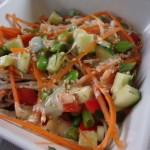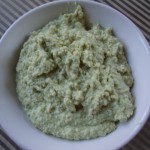Non-Animal Calcium Sources
I had an uniformed person tell me that because I don’t consume dairy products, I will end up with osteoporosis. I was appalled. So after I decked him . . . okay, no . . . after I felt like decking him, I politely informed him that there are actually better forms of calcium than dairy. I proceeded to school him and it felt even better than had I punch him out. (Just to note, I’m not an angry vegan, just a passionate one and I would never resort to violence to get my point across.) 🙂 And check out this great infographic from LearnStuff.com.
 Seriously though, there is a reason that the U.S. has the highest rates of osteoporosis, yet we consume those most dairy. If milk is so good for the bones, shouldn’t that rate be the opposite? Well, what happens when we ingest cow’s milk which contains a certain acid, our body immediately responds by trying to neutralize that acid. How it does that, is by releasing calcium from our bones. That’s right. The very stuff you’re hoping to absorb from milk is actually being leeched out of your bones. Read more about it HERE.
Seriously though, there is a reason that the U.S. has the highest rates of osteoporosis, yet we consume those most dairy. If milk is so good for the bones, shouldn’t that rate be the opposite? Well, what happens when we ingest cow’s milk which contains a certain acid, our body immediately responds by trying to neutralize that acid. How it does that, is by releasing calcium from our bones. That’s right. The very stuff you’re hoping to absorb from milk is actually being leeched out of your bones. Read more about it HERE.
Did you know that it takes 3 servings of dairy to get the same amount of calcium in one serving of veggies? Not only that, the veggie calcium is absorbed more fully and is more easily digested. Why do you think the dairy industry has the “3-A-Day” campaign?
The recommended intake for calcium for adults 19 through 50 years is 1000 milligrams/day.
A 12-year, Harvard University study has made some remarkable advances in the calcium conundrum and they found that there may not be a relationship between consuming large amounts of calcium and bone strength. For strong, healthy bones, we need to reduce our animal protein and salt intake and increase the amount of weight-bearing exercise.
Fortified, non-dairy milk has anywhere from 150mg to 500mg of calcium per 1 cup! Tofu is loaded with calcium (and protein) with up to 270mg per 1/2 a cup. Drink calcium fortified OJ and also receive a dose of vitamin C. Snack on 1 cup of almonds and get a whopping 377mg of calcium. And don’t forget your Tums…they’re not just for digestive upset. They are a great calcium supplement, providing 800mg per serving (2). They come in assorted fruit flavors, so they don’t taste like you’re eating chalk! Well . . . flavored chalk, maybe. Also . . . Yoplait yogurt actually has less calcium than Silk soy yogurt.
Vegetables
Beet greens, bok choy, broccoli, brussels sprouts, carrots, Chinese cabbage and lettuce, collard greens, dandelion greens, kale, mustard greens, okra, parsnips, rapini, rutabaga, snap peas, wax beans, squash, zucchini, sweet potatoes, turnips greens
Legumes
Adzuki beans, black beans, garbanzo beans, great northern beans, kidney beans, lima beans, navy beans, pinto beans, refried beans, soybeans, white beans, tofu
Fruits
Currants, figs, oranges, papayas, raisins, kiwi
Nuts and Seeds
Almonds, almond butter, (and don’t forget almond milk), Brazil nuts, hazelnuts, pistachio nuts, sesame seeds, sesame butter (tahini), sunflower seeds, walnuts
Why not enjoy the benefits of non-dairy calcium sources ? Especially when the moo juice is linked to obesity; asthma; allergies; infertility; kidney stones; migraine headaches; cancer; irritable bowel syndrome; hypothyroidism and other hormone issues; acne; fibroids; fibromyalsia; and autism . . . the list goes on. Anyone with a chronic inflammatory disease really should consider eliminating dairy from their diet since dairy is known to aggravate inflammation.
Think You Know Your Milk Alternatives?
I thought I did until I read a fabulous article in my local newspaper paper recently where the writer, Rachel Bucci looked at the different “milk” choices and broke them down for us:
SOY MILK:
Taste: somewhat creamy, nutty Why To Try: lactose intolerance, milk allergies, vegan diet Why To Avoid: soy allergies; contains phytoestrogens so women with a history of breast cancer or hormone stimulated cancer and those with thyroid issues may want to be cautious Nutritional Profile: complete protein (just like cow’s milk) with hearty-healthy antioxidants. U.S. soy is highly processed and often genetically modified. Look for organic versions. Try This: Silk, West Soy
HEMP MILK:
Taste: creamy, sweet, a bit greasy Why To Try: lactose intolerant, milk allergies, vegan diet Why To Avoid: higher in fat profile than other cow milk alternatives Nutritional Profile: high in omega-3 and -6 essential fatty acids and phosphorous. Hemp milk does not contain doses of THC found in marijuana Try This: Living Harvest, Tempt
OAT MILK:
Taste: subtle, slightly sweet and light consistency Why To Try: lactose intolerant, milk allergies, vegan diet Why To Avoid: oftentimes processed in facilities that handle gluten products. Those with a gluten intolerance or celiac disease should avoid oat milk Nutritional Profile:high in fiber, beneficial phytonutrients Try This: Pacific Organic Oat Milk
ALMOND MILK:
Taste: sweet, nutty flavor, somewhat watery Why To Try: lactose intolerant, milk allergies, vegan diet Why To Avoid: nut allergies Nutritional Profile: not a complete protein but rich in magnesium, potassium, manganese, copper, antioxidants, vitamin E and selenium, and calcium. Also contains healthy monounsaturated fats. Try This: Almond Breeze, Diamond Blue
RICE MILK:
Taste: mild and sweet, somewhat watery Why To Try: lactose intolerant, milk allergies, vegan diet Why To Avoid: high in the glycemic index. It’s noted that those with diabetes and other concerned about high-glycemic foods might want to try another option Nutritional Profile: low in protein, can be high in sugar and carbohydrates Try This: Rice Dream Enriched Original







